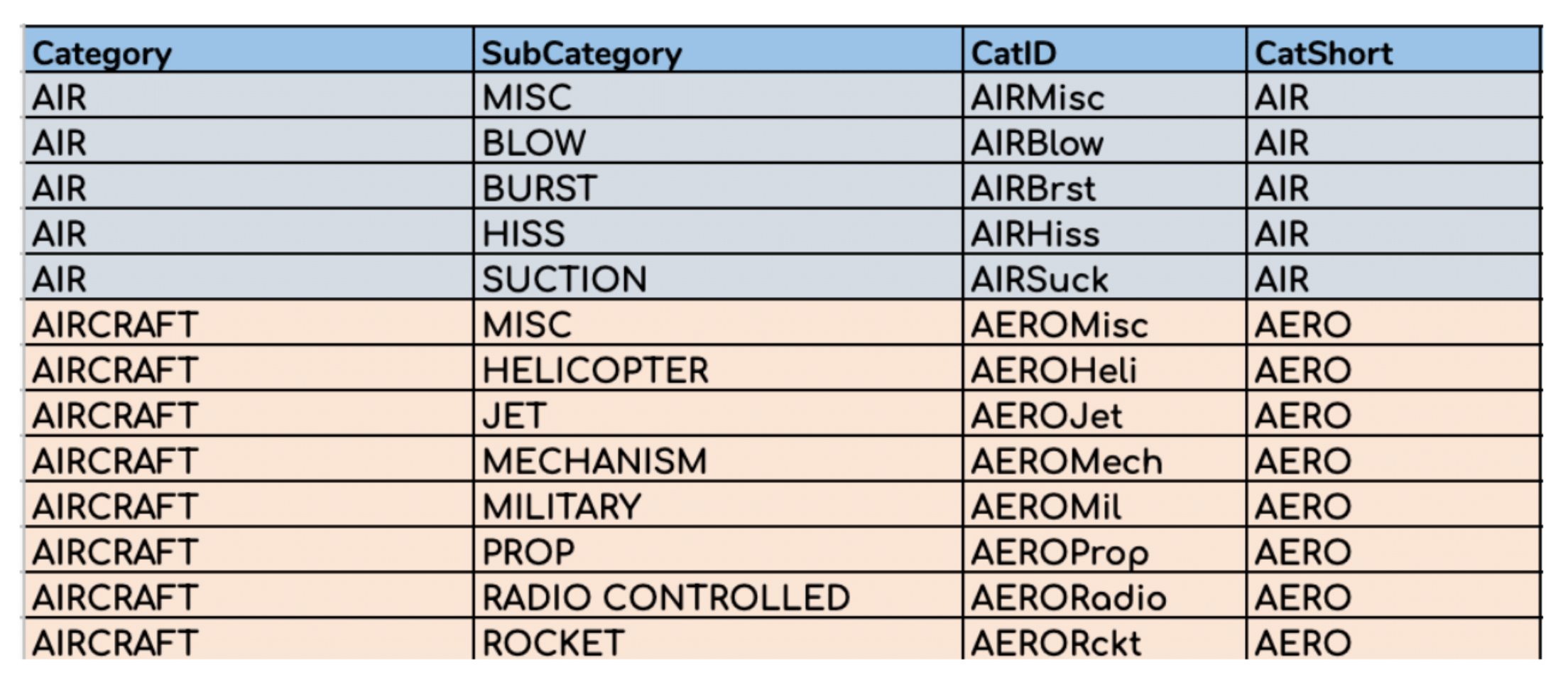At Shapingwaves, our mission has always been to provide sound designers and audio professionals with top-quality libraries that are as intuitive to use as they are inspiring to create with. To enhance the accessibility and usability of our libraries, we are excited to announce that all our future releases will adopt the Universal Category System (UCS) and our current releases are currently being updated to UCS as well.
This shift to UCS is more than a technical upgrade—it’s a commitment to delivering libraries that integrate seamlessly into modern workflows and meet the highest industry standards.
What is UCS?
The Universal Category System (UCS) is an open standard for organizing and naming sound effect libraries. It was created by industry professionals to establish consistency and streamline workflows. By adopting UCS, libraries become universally compatible, easier to search, and highly organized.
Why UCS Matters
Sound libraries can contain thousands of files, making organization critical for efficient workflows. Inconsistent naming conventions or poorly structured metadata can turn finding the right sound into a frustrating experience. UCS resolves these challenges by standardizing the way libraries are categorized, labeled, and described.
By using UCS, libraries achieve:
- Consistency: Unified naming and metadata standards ensure that libraries are easy to navigate, even when combining collections from multiple sources.
- Searchability: Structured filenames and detailed metadata make it easier to locate sounds quickly, whether through a database or file browser.
- Workflow Integration: UCS is widely recognized in the industry, ensuring smooth integration into existing setups without the need for renaming or reorganization.
Advantages of UCS for Shapingwaves Libraries
- Streamlined Organization
UCS brings structure and clarity to sound libraries. With predefined categories and subcategories, every sound is logically placed, allowing users to browse intuitively. - Detailed Metadata
Adopting UCS means that metadata fields are populated with essential information, providing context and ensuring sounds are easy to understand without opening the file. - Efficiency in Collaboration
Standardized naming conventions reduce misunderstandings when sharing files or collaborating on projects, keeping everyone on the same page. - Future-Proof Design
As the UCS standard evolves, it remains aligned with industry needs. By adopting UCS, we’re ensuring that our libraries stay compatible with current and future tools. - Ease of Use Across Tools
Whether you’re using a sound database like Soundminer, working in a DAW, or browsing files directly, UCS ensures that our libraries fit seamlessly into your workflow.

Looking Ahead
At Shapingwaves, we view UCS as a natural step toward enhancing the usability and professionalism of our libraries. By standardizing how we name and organize our files, we’re ensuring that users can focus on creativity rather than file management.
All future Shapingwaves libraries will follow UCS guidelines, delivering consistency, clarity, and reliability. We’re excited about this change and confident that it will significantly improve your experience with our sound effects.
Thank you for joining us on this journey toward a more organized and efficient future. Stay tuned for our upcoming UCS-compliant releases!
learn more about UCS:
UCS credits
Thanks to the clever people who helped make UCS happen:
Special thanks to Justin Drury at Soundminer, and to Kai Paquin, for all their help in bringing UCS to life.
To the brain trust who spent hours on zoom meetings helping us hash out the list itself: Andrew Quinn, Andy Martin, Arnoud Traa, Cédric Chatty, Chris Battaglia, Jeff Davis, Justin M. Davey, Michal Fojcik, Mikkel Nielsen, Paul Poduska, Roy Waldspurger, Théo Terror, Tim Farrell, and Tristan Horton.
To Andrew Moore for UCS File Renamer, Aaron Cendan for his excellent Reaper tools for UCS, and Michael Pierluissi and Mark Winter for the Renamer tools. And to Steve Paquin for developing Audio Category Clipper, the best program for newcomers to the system.
And to the people around the world who helped craft the various translated versions of the list: Oscar Rydelious, Gray Haugholt, Are Teashkin, Vitali Zavadskyy, Alvaro de Iscar, Andrii Voloschuk, Gustav Landerholm, Danijel Djuric, Colin Walder, Mikkel Nielsen, Michal Fojcik, Barbara Kapica, Arseny Tishkin, Mehmet Aksoy, Derrick Espino, Giel van Geloven, Arnoud Traa, Frank Kruse, Bo Li, Jamie Lee, Deb Dourneau, Alan Zili, Sami Kiosk, Katrine Amsler, Simone Micheli, Aline Brujins, and Prashant Mishra, Muyan Pei, JingDong Yue, Yang Ding, Suty Shen, Eddy Liu, Xingyu Liu, Vatalli Stepchenko, Sultan Almasoud.
And to Prashant Mishra for all his work building and maintaining this homepage. Thank you so much!